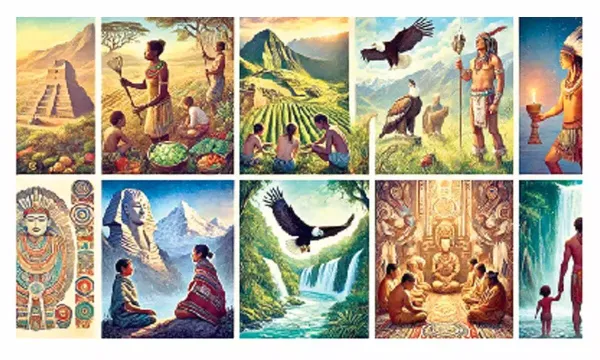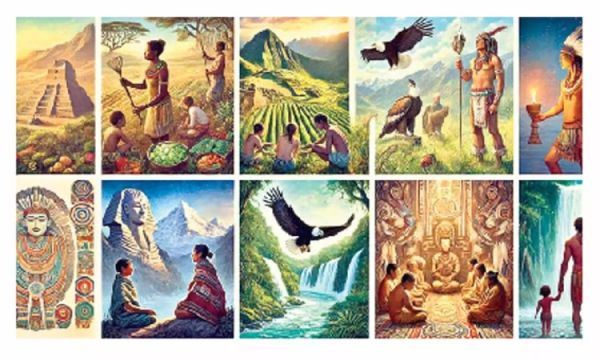
An notable academic who bridges the fields of nanoscience, culture, and spirituality is Prof. Yashwant Pathak, dean of Florida University and founding member of the International Centre for Cultural Studies (ICCS). In a recent conversation at Sharda University in Greater Noida, Prof. Pathak explored the timeless values ingrained in long-standing customs. His talk shed light on how these age-old customs still promote peace between people and the natural world, cultural resilience, and world peace.

Ancient Traditions of Respect for Nature
Ancient customs from all throughout the globe have a strong connection with nature. For example, African societies place a strong focus on coexisting peacefully with the environment. Their actions, including not plowing the soil needlessly, show a dedication to maintaining the land’s fertility and honoring its natural cycles. Ubuntu, which translates to “I am because you are,” is an African philosophy that embodies this way of thinking. It emphasizes how all creatures are related and how crucial cohabitation and respect are to one another.
In a similar vein, South American indigenous civilizations have a profound respect for the natural world. Their spiritual ties to the ground and the universe are shown by the 82 ancient temples found in the Andes. Eagles and condors are two examples of symbols that bridge the spiritual beliefs of North and South American civilizations by embodying the interdependence and balance of existence.
Cultural Adaptation and Migration
Prof. Pathak emphasized the tenacity of customs in the face of migration, especially during the British colonial era. Descended from Indian indentured servants, the “Girmitiya” group brought their cultural legacy with them to new places. They accepted their new nations as their own despite being uprooted, upholding customs like hand-copying the “Tulasi Ramayana.” Their persistent spirit is shown by this combination of patriotism and cultural preservation.
A special connection between the migrants and their new countries was also cultivated by migration. Because of their respect for the natural and spiritual worlds, these societies saw the earth as a loving mother. This viewpoint is in line with the idea of respecting one’s ancestry while adjusting to new surroundings in order to ensure its survival.
Nonviolence and World Peace
Peace and cooperation are generally encouraged by ancient traditions. India’s “sarve jana sukhino bhavantu,” or the concept of universal pleasure, is in line with Nelson Mandela’s African-inspired ideology of harmony. These ideals, which are ingrained in everyday activities, rituals, and prayers, promote kindness and peace.
Ancient traditions have never promoted terrorism, in contrast to contemporary ideologies that have sometimes incited bloodshed. Their fundamental conviction that wellbeing and connectivity are universal transcends borders. For example, Native American rituals place a strong focus on having a direct relationship with God, which is often made possible by peaceful natural environments like running streams. These customs promote reflection, harmony, and a deep comprehension of the cyclical essence of existence.
Ancient Beliefs on Gender Equality
In contrast to the patriarchal standards of contemporary society, gender equality was embraced in many ancient cultures. Deities were often shown as protective mothers; for example, goddesses were frequently seen nursing their offspring. This respect for parenting emphasizes how important women are in forming civilizations.
For instance, in their traditions, the Maori people of New Zealand value maternal knowledge. Their grieving customs, which include spending days without cooking and not leaving the departed alone, demonstrate a profound regard for community and group care. These customs highlight how crucial women are as the main teachers and stewards of cultural values.
Spiritual and Linguistic Relationships
Professor Pathak examined how ancient societies were related on a linguistic and spiritual level. For example, thirty percent of the terms in the Lithuanian language are Sanskrit, indicating common ancestry and centuries of cross-cultural interaction. Likewise, fire worship, a cross-cultural practice, represents change, cleansing, and a closer relationship with God.
African Zulu customs place a strong emphasis on the idea that all creations have a purpose, which is reminiscent of Buddhist and Hindu ideas of reincarnation and global unity. Through prayers that transcend personal needs and advance the welfare of humankind as a whole, Native American spirituality likewise promotes global well-being.
Modern Life Philosophies
Ancient wisdom has important lessons to teach the contemporary world. Ubuntu, or “I am here because of you,” is an African Zulu philosophy that promotes interdependence and respect for one another. The Hopi tribe’s native passports also demonstrate their dedication to maintaining their identity while interacting with the outside world. These values, which are based on community and mentoring, are still applicable in the connected and fast-paced world of today.
Professor Pathak also offered a scientific viewpoint, relating the “Bhagavad Gita’s” notion of oneness to the fundamental components of existence. This ideology emphasizes the interconnectedness of existence by holding that the cosmos is derived from a single source.
Preserving Traditional Knowledge
The younger generation was urged to investigate and accept traditional customs by Prof. Pathak’s talk. Whether they originate in Africa, India, the Americas, or another region, these customs provide answers to urgent problems like social injustice, environmental degradation, and cultural estrangement.
We are reminded of the traditions’ ongoing significance by Native American rites, the tenacity of “Girmitiya” communities, and the egalitarian ideologies of earlier societies. We can solve current problems and create a more humane and sustainable future by incorporating their tenets—harmony with nature, respect for variety, and world peace.
A Handbook for the Future
“The past is not a relic; it is a guidepost for the future,” Prof. Pathak said eloquently. The secret to overcoming cultural barriers, promoting peace between people and the natural environment, and igniting a feeling of purpose lies in ancient traditions. We may use their knowledge to negotiate the challenges of contemporary life and build a society based on harmony, peace, and respect for life by going over these timeless principles again.